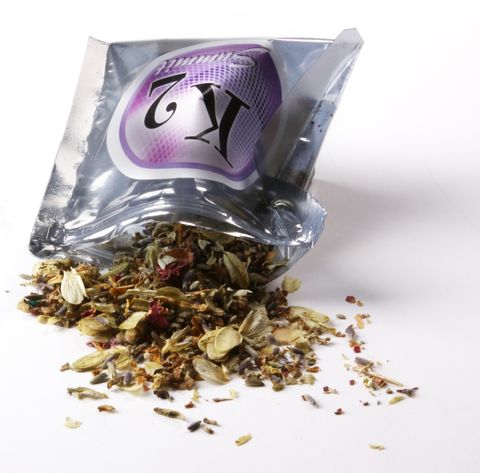At least 1 person is dead and 38 have been hospitalized in Illinois after overdosing on K2, a substance that purports to simulate the effects of marijuana.
By
Stacey Leasca
- Synthetic marijuana, also known as spice or K2, is a drug consisting of hundreds of chemicals that mimics the high produced by marijuana
- Last month, one person died and 38 people were admitted to Illinois hospitals as a result of overdosing on synthetic marijuana, causing them to bleed profusely from their eyes and ears and experience bloody urine
- Many of these people tested positive for brodifacoum, which is often used as rat poison
In
March alone, 38 people visited emergency rooms in the state after
ingesting synthetic marijuana, also known as Spice or K2, a synthetic
product legally sold in convenience stores. Their symptoms ranged from
severe bleeding from the eyes and ears to coughing up blood and having a
severe bloody nose, according to Illinois’ Department of Public Health. On Saturday, one person even died after consuming the drug, the Chicago Tribune reported.
“Despite
the perception that synthetic cannabinoids are safe and a legal
alternative to marijuana, many are illegal and can cause severe
illness,” Nirav D. Shah, director of the Illinois Department of Public Health, said in a statement. “The recent cases of severe bleeding are evidence of the harm synthetic cannabinoids can cause.”
Now, public health experts are warning people once again about the dangers of synthetic marijuana.
What is synthetic marijuana?
Synthetic marijuana is typically made up of dried
and shredded plant material, which is meant to look like marijuana. That
material is then doused with any number of chemicals, including
synthetic cannabinoids that are meant to get the user high.
According to Leafly,
these chemicals work by binding to the same system of receptors in our
brains as tetrahydrocannabinol (THC), the primary psychoactive
ingredient in herbal cannabis. In some cases, synthetic marijuana can be
two to 100 times more potent than naturally occurring THC.
This isn't the first time that people have overdosed on synthetic marijuana. Last year, more than 100 people in Lancaster, Pa., were admitted to the hospital after overdosing on K2. Similar outbreaks have also occurred in New York City, which saw more than 6,000 emergency room visits as a result of K2 in 2015.
Part
of what makes synthetic cannabis so dangerous is that there's often no
way to tell what chemicals are in the drug. According to the University of Arkansas for Medical Sciences,
there are now more than 150 different types of synthetic marijuana
compounds now on the market, and the Centers for Disease Control and
Prevention has issued a statement saying there are “no standards for
making, packaging, or selling synthetic cannabinoid chemicals. That
means that two packets of a brand-named product may have completely
different chemicals.”
Furthermore, synthetic
marijuana products may also be contaminated with other drugs or toxic
chemicals. Melaney Arnold, a public information officer for the Illinois
Department of Public Health, told MensHealth.com
that nine of the 38 cases in Illinois tested positive for brodifacoum,
“a lethal anticoagulant often used as a rodenticide, or rat poison."
Brodifacoum inhibits the body's ability to clot blood, which may explain
the excessive bleeding.
"The long-term effects of long-term synthetic cannabinoid use are unknown."
What are the health risks of consuming products like K2 and Spice?
The list of possible side effects is endless. According to the CDC,
ingesting fake weed can cause side effects ranging from agitation,
sleepiness, irritability, confusion, dizziness, incoordination,
inability to concentrate, stroke, and seizures, to hallucinations,
psychosis, heart attacks, kidney failure, and death.
Arnold
noted that these health problems depend on many factors, including the
specific synthetic cannabinoid, the dose a person ingested, and the
duration of use. “The long-term effects of long-term synthetic
cannabinoid use are unknown,” she told MensHealth.com.
Is it legal to buy and sell synthetic marijuana?
Yes
and no. While some formulas of synthetic marijuana are illegal in
various states, manufacturers circumvent the law by tinkering with the
chemical makeup of their product. For example, in 2011, the Drug
Enforcement Administration (DEA) banned the possession and sale of five
common synthetic marijuana chemicals, but many manufacturers simply
changed the compounds in their products to make them slightly different.
The
products are then sold legally in convenience stores and on the
internet, even though many are sold with warning labels saying the
product is "not for human consumption."
What is the treatment for a synthetic marijuana overdose?
As Dr. Patrick Lank, a medical toxicologist who works at Northwestern Memorial Hospital, told the Chicago Tribune,
there is no antidote for synthetic marijuana. The only way for doctors
to treat an overdose is to help manage the comedown and prescribe
extremely high doses of vitamin K for those experiencing bleeding to
overcome the bleeding.
Patients must take
prescription-strength vitamin K for weeks or months after they overdose.
The state health department even sent out a memo to area pharmacies
warning that they may see an uptick in prescriptions for the vitamin.
“Although
unusual to see such high doses prescribed, due to the long-acting
nature of this poisoning, these high doses are required,” the memo read.
Per the Illinois Department of Public Health,
if anyone around you ingests these drugs and experiences excessive
bleeding, call 911 or have someone take them to an emergency room as
soon as possible.



No comments:
Post a Comment